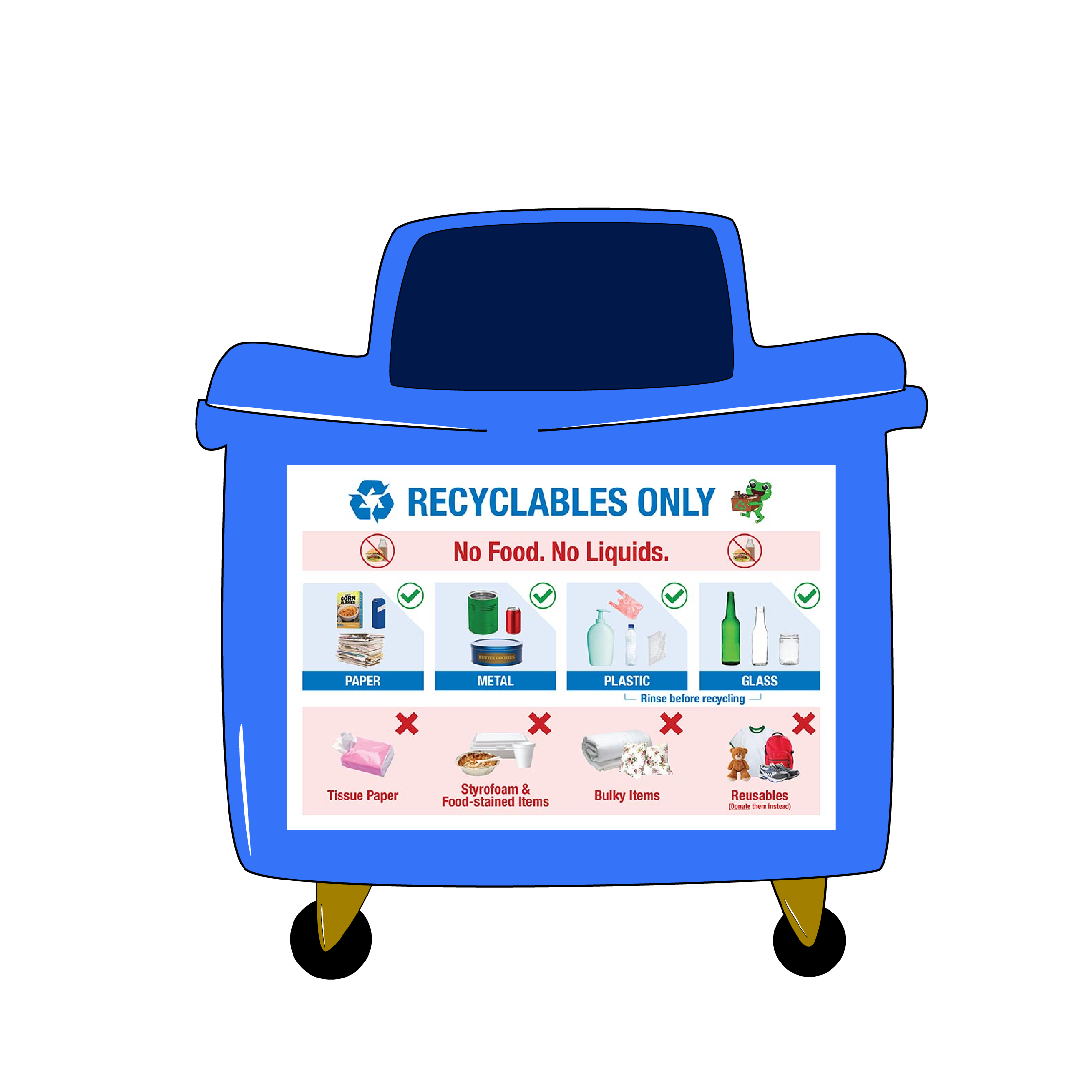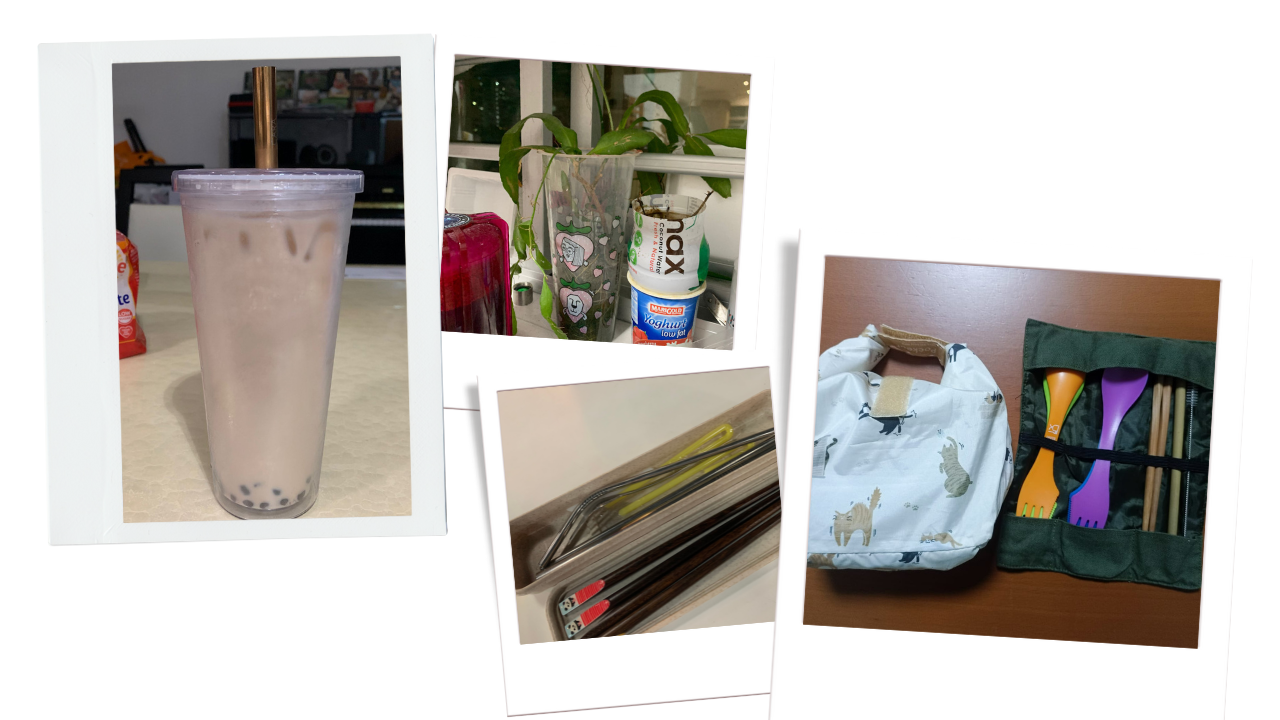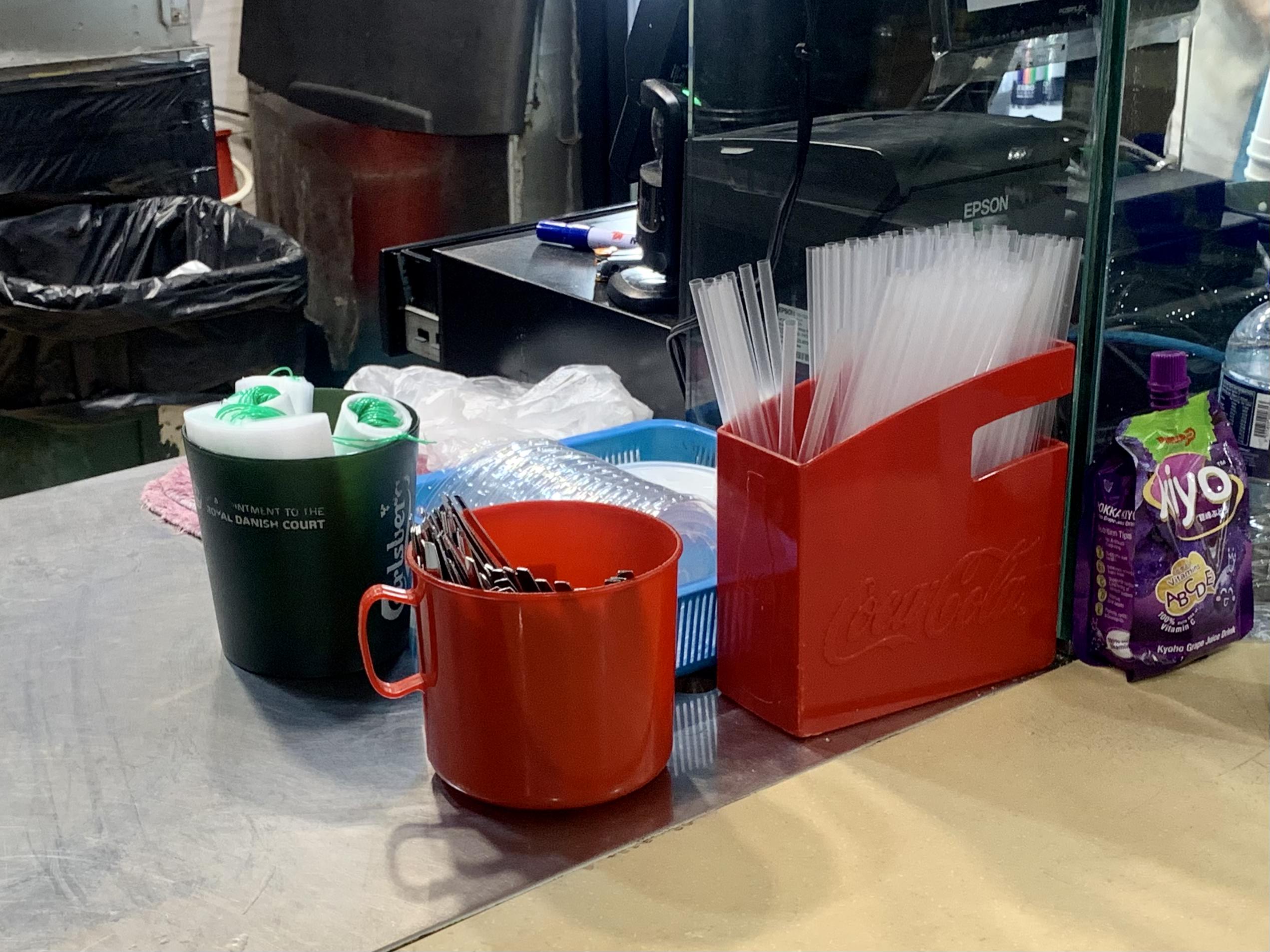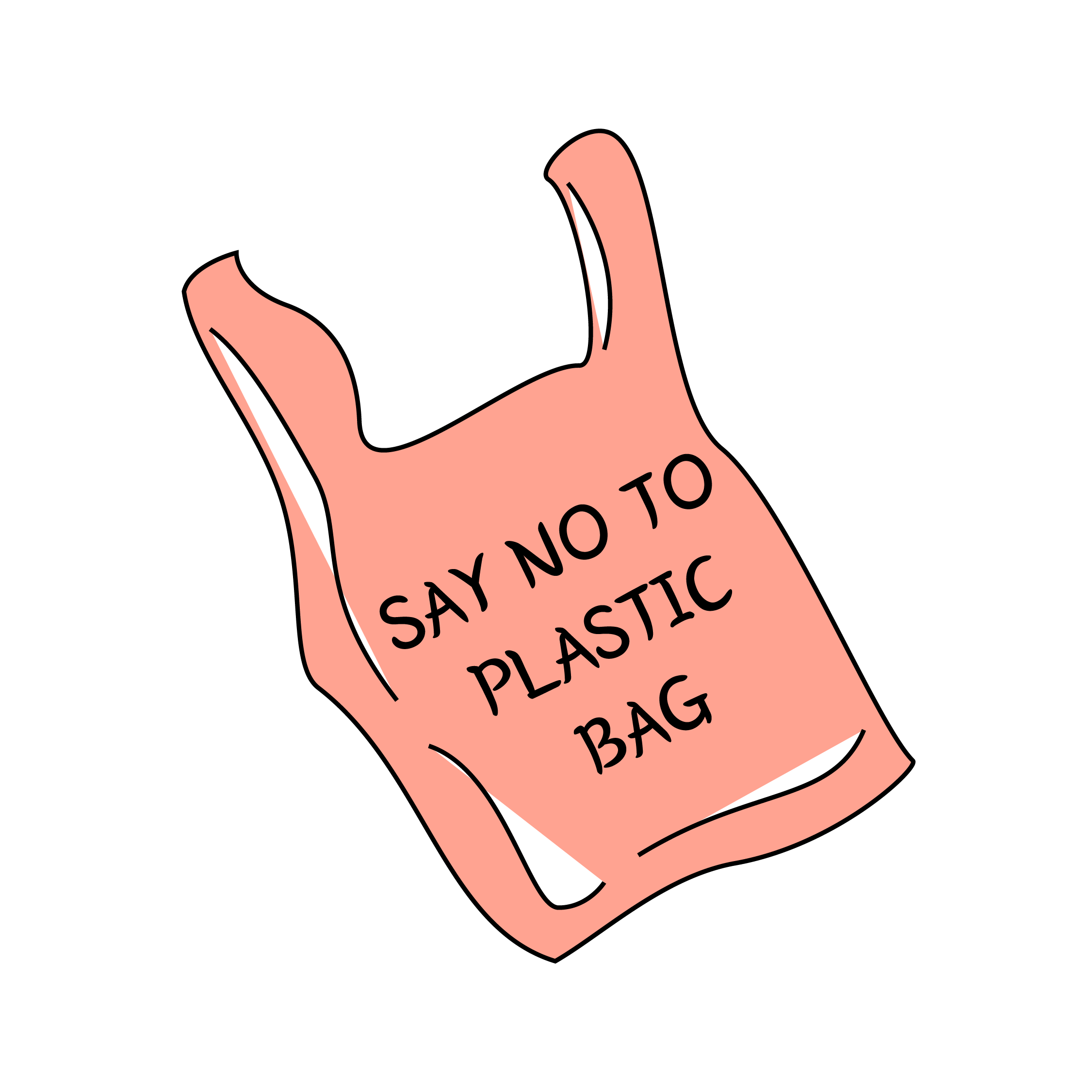The Challenges We’re Facing to Live More Sustainably
CELEST THAM discovers the struggles of leading a greener lifestyle and asks experts for advice on how to overcome them.
Using resusables and recycling bins are some green practices that a lot Singaporeans are familiar with. Photo courtesy of Fong Qi Hua (left) and Celest Tham (right).
BY
Celest Tham
Section Editor
Hype Issue #55
Published on
August 2, 2022

The amount of waste generated by her regular drinking of bubble tea, a video of a plastic straw found inside a turtle’s nostril and the overwhelming usage of disposable takeaway containers during the circuit breaker period are just some of the reasons Ms Jasmine Chan, 21, an environmental studies student, was inspired to practise sustainable habits.
In an effort to reduce her plastic consumption, she began by reusing the plastic bubble tea cups that she acquired. Now, she uses reusable cups and containers instead.
There is also Timothy Leung, 19, who adopted sustainable habits after first being introduced to metal straws in 2017.
“Most of the time when I go out, I’ll bring along a small container consisting of cutlery such as different sizes of metal straws,” says Timothy. “I also bring my own bag and container for takeaway food. If I want to eat food from outside but I don’t have my container, I’ll just eat it there to avoid using disposable packaging.”

Carrying reusable cutlery, bottles and containers, and reusing plastic cups for gardening are some habits they have integrated into their lifestyles. Photo courtesy of Jasmine Chan (top), Timothy Leung (bottom left), and Fong Qi Hua (bottom right).
Ms Fong Qi Hua, 28, credits the 2020 Covid-19 circuit breaker period for kickstarting her journey to a more sustainable lifestyle. The major clean-up she did during that period helped her gain consciousness about the waste she accumulates.

Recommended by Ms Fong, Olio is a free sharing app that serves as a platform for people to give away items they no longer need. Screenshot taken by Celest Tham.
The call to live a sustainable lifestyle is louder than before, especially seeing how climate change has been affecting us directly. One piece of evidence is the red hot signal sent by the intense heat that occurred across the world in July this year. We too can feel it – there was a night when temperatures in Singapore hit close to 30 degC.
However, to be frank, it is clear that not everyone is leading a greener lifestyle despite being aware of the issue.
As mentioned in the Singapore Green Plan, “Start Changing Some Personal Habits” is one of the actions individuals can take to tackle climate change. “Change” is not something we can achieve easily. If you are someone who has been making an effort to live as sustainably as possible, you might find the following challenges relatable.
Source of challenge: myself
“Personally, I feel that the greatest challenge would be the commitment of maintaining sustainable habits, as the price to pay would be in terms of time and effort spent,” says Ms Fong. “I remember there was a friend who once told me that she liked the idea of being eco-friendly, but she couldn’t commit as it would be too troublesome.”
For individuals, it starts with having a firm belief that it is the right thing to do.
According to Timothy, his motivation sometimes gets affected when he is questioned on his habit of “bringing so many things to takeaway food”.
“Very few people do what I do, at least in my circle of friends, so I would be the odd one out,” says Timothy. “It has already become a habit for me so it’s not too difficult to maintain it, motivation-wise, at the very least I do my part. I can’t control what others do.”
Mr Ho Xiang Tian, 26, the co-founder of environmental group, LepakInSG, shares his opinion on what motivates people to start making changes to their habits.
“If you want people to voluntarily do something, they must feel for it themselves,” says Mr Ho. “Everyone has their own trigger point when they really feel something is not right and they should do something… I don’t think we would know what would trigger an individual to change, but it helps when they see people around them doing the same thing.”
Before we do the “right thing”, what about taking some time to go through a thought process?
Ms Chan suggests one to seriously consider how realistic their sustainability choice is and refrain from blindly jumping on bandwagons. For example, if someone purchases a metal straw which ends up not being used, or worse, disposed of, it turns their sustainability choice into an environmental problem instead.
“With every environmental solution, there’s bound to be caveats and limitations, so think of what is being exchanged or sacrificed when you make a certain sustainability choice – refusing disposables often means washing more utensils, which requires more water as well; the production of metal straws have a much greater carbon footprint as opposed to plastic straws, so it’s only ‘better’ for the environment when used hundreds of times,” says Ms Chan.
Source of challenge: the people around me
Singapore has become more green-conscious based on the National Environment Agency’s statistics. In 2021, the overall recycling rate was 55 per cent compared to 52 per cent in 2020. Singapore residents are also getting more and more familiar with the available ways to recycle, one of them being the blue recycling bins.
Blue bins were introduced in 2001 with the aim to encourage recycling in Singapore. They provide convenience and ease in recycling as there’s no need to sort the recyclables. This approach is a rare sight in other countries. However, at the same time, this system causes people’s efforts to easily go to waste if foods or liquids are thrown inside. This causes contamination and the recyclables will become no different from general waste that ends up being disposed of. It is known that 40 per cent of the items collected are not recyclable due to contamination.
In response to this issue, Ms Melissa Lam, 30, a sustainability consultant and the founder of Bamboo Straw Girl, a social enterprise that produces earth-minded lifestyle products, suggests that, instead of being completely discouraged from recycling by this statistic, the general public can view this issue in a more optimistic way.
“Putting things into the recycling bin in the proper way is like a vote of confidence that hopefully this will be recycled well, and that we believe in the importance of having a recycling system in place,” says Ms Lam. “If people are unwilling to take this first personal step, then there’s no way that change can be made on a larger scale.”
The use of blue bins also largely depends on the collective effort of everyone in the family. Timothy acknowledges that it is not an easy commitment for his family as “a lot of reminders are needed”.
The same goes for Ms Chan: “It took a while for my family to come on board when it came to recycling and bringing our own containers. I would often receive a response like ‘This one also need recycle ah?’ when I asked to bring bottles home to clean and recycle.”
Ms Lam also agrees that the people closest to us are the hardest to convince. When we focus too much on trying to change people, we get stressed when people do not respond as we wish. This can distract us from the more important things, such as the reason why we started and the efforts that we have already made.
“By making conscious choices of our own, we can lead by example and subtly invite people to have conversations about sustainable actions with us. We don’t need to force them to do the same immediately. The fact that they are open to having the conversation is a wonderful first step,” says Ms Lam.
By making conscious choices of our own, we can lead by example and subtly invite people to have conversations about sustainable actions with us.
This brings us back to the idea of different trigger points for each individual, and keeping up with our efforts is key to reaping desired outcomes.
“Perseverance coupled with encouragement to my family definitely led to visible change in their mindset and we now work towards a more sustainable lifestyle as compared to before!” says Ms Chan.
Source of challenge: the system
The phrase “do your part” no longer has an impact to move people. These days, people have started to wonder if an individual’s impact is futile, knowing that the majority of greenhouse gases are produced by a handful of companies, and that there would be lots of digits behind zero if we were to calculate the carbon emissions attributable or saveable by an individual.
In this video by Our Grandfather Story, topics such as carbon offsetting and climate anxiety were discussed. Video taken from Our Grandfather Story on YouTube.
That thinking is both right and wrong. It is wrong as the companies are operating due to the existence of consumers, in other words, meeting our demands. However, it is right in stating that the impact of making a difference alone is insignificant.
For example, if I refuse a plastic bag when the merchant has already stocked a large amount of them, the plastic bags will still be given to the next customer or be disposed of when the bags disintegrate after being kept too long. This is a system that works against the objective of sustainability and is beyond our control.

Different kinds of plastic packaging can be seen prepared by a hawker centre drinks stall. Photo by Celest Tham.
It is clear that because not every part of society will take part of their own accord, corporations and lawmakers are needed to provide leadership. Climate actions like meaningfully reducing the amount of plastic bags used or having policies such as a carbon tax can only be achieved by them.
As corporations and lawmakers are really just groups of people, it is essential to show them that we care, and that messages can only be effectively delivered to them through our collective action.
“[Although] individuals’ control over the system is very limited, what you can do is join together as a collective that can have more influence than individuals alone,” says Mr Ho.
Mr Ho also suggests that joining or helping the environmental clubs’ effort in making changes in school would have a bigger impact than keeping up with green habits alone.
It can also be as simple as striking up conversations about our everyday choices, be it with family and friends, neighbours or strangers.
“I don’t have a rubbish bin at home. I do have an informal recycling corner [and probably] a cat kibble bag that will be our wet trash bag. When visitors come to our home, they are a little surprised but this also makes them confront the trash that they create and it sparks a thought process on how to handle their trash,” says Ms Lam. “These are little things that can leave an impression on people we interact with.”
Contributing in sustainability efforts can be done in many ways. The most important thing is to find the best sustainable choice in one’s current life situation, which would look different for different people.
“It’s not like there’s a black and white in terms of going green,” says Ms Lam. She introduces her 3Rs – refuse, reduce, rethink. For example, going through a thought process for alternatives such as swapping clothes or buying secondhand or like-new, since not everyone is able to afford ethical brands that come at a higher price point.
“Arguably, purchasing the best quality that they can afford may be the way forward, even if that may be a piece from a fast fashion brand. The key would be to wear that piece of clothing for the maximum of its potential lifespan,” says Ms Lam.
Lastly, don’t forget why you started the sustainability effort in the first place.
“Forming habits takes time and so if you’re still considering or you’ve already decided to commit to certain sustainability choices, “just do it” and remember why you’re doing what you’re doing!” says Ms Chan.
Forming habits takes time and so if you’re still considering or you’ve already decided to commit to certain sustainability choices, “just do it” and remember why you’re doing what you’re doing!



jazz cafe
meditation music
healing meditation
Can you be more specific about the content of your article? After reading it, I still have some doubts. Hope you can help me.
I don’t think the title of your article matches the content lol. Just kidding, mainly because I had some doubts after reading the article.
Can you be more specific about the content of your article? After reading it, I still have some doubts. Hope you can help me.
Your article helped me a lot, is there any more related content? Thanks!
Your article helped me a lot, is there any more related content? Thanks!
Your article helped me a lot, is there any more related content? Thanks!
Your article helped me a lot, is there any more related content? Thanks!
Your point of view caught my eye and was very interesting. Thanks. I have a question for you.
Thanks for sharing. I read many of your blog posts, cool, your blog is very good.
Thanks for sharing. I read many of your blog posts, cool, your blog is very good.
I don’t think the title of your article matches the content lol. Just kidding, mainly because I had some doubts after reading the article. https://www.binance.info/pt-BR/register-person?ref=YY80CKRN
Thank you for your sharing. I am worried that I lack creative ideas. It is your article that makes me full of hope. Thank you. But, I have a question, can you help me?
I don’t think the title of your article matches the content lol. Just kidding, mainly because I had some doubts after reading the article.
Thanks for sharing. I read many of your blog posts, cool, your blog is very good.